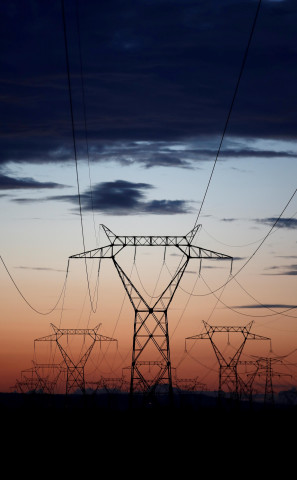Pakistan's power sector takes Rs300b revenue hit
Shortfall due to drop in electricity sales, tariff freeze

PHOTO: REUTERS
The power sector has suffered the revenue shortfall on account of a drop in electricity sales due to lockdown, freezing of power tariffs and putting off bill payments.
The government has deferred any increase in electricity prices until June 2020 on account of fuel price and quarterly adjustments to provide relief to the consumers, which has resulted in a revenue loss of Rs138 billion.
The National Electric Power Regulatory Authority (Nepra) had determined a tariff increase of Rs1.61 per unit, which was due to be passed on to the consumers in the second quarter of the current year.
In addition to it, a tariff hike of Rs2.44 per unit on account of the fuel cost adjustment for December 2019 and another Rs1.76 per unit for January 2020 were also due, which had not been passed on to the consumers.
Pakistan's power sector’s losses highest in region
At present, the average consumer tariff including taxes and surcharges is Rs18.65 per unit, which includes Rs4 per unit on account of taxes, duties and surcharges.
The government has also deferred payment of electricity bills, which has led to a revenue shortfall of Rs100 billion. Moreover, the Covid-19-fuelled lockdown to contain the spread of the virus has caused a drop in demand for electricity by different sectors, which has resulted in a revenue loss of Rs66.8 billion.
The lockdown has hit the energy sector hard as revenue collection plunged 47% in the power sector in March only.
The cash shortfall due to lower recovery of electricity bills from the consumers, thin demand, payment of subsidies, non-passing of costs and losses has resulted in payment of Rs67 billion by the Central Power Purchasing Agency (CPPA) to sector entities against bills of Rs126 billion, which accounted for 53%.
According to audited figures for March 2020, the recovery of electricity bills from end-consumers declined to 85% compared to 94% in March 2019. The remittance to CPPA dropped 11.3% from the power distribution companies. Industrial and commercial consumption of electricity fell 25% and 27%, respectively.
Following the hit to revenue, the government is now trying to arrange commercial financing from banks. It is working on issuing Sukuk-II worth Rs200 billion and arranging fresh financing facility of Rs100 billion.
However, delay in undertaking these measures is resulting in the financial collapse of the power sector.
Officials say the worsening situation would also add to the circular debt, which would increase woes of other energy companies as well like Pakistan State Oil (PSO), Sui Northern Gas Pipelines Limited (SNGPL), Sui Southern Gas Company, Pakistan Petroleum and Oil and Gas Development Company, which are suppliers of oil, gas and liquefied natural gas (LNG).
Renegotiating contracts for power projects
Total receivables of PSO stood at Rs346 billion as on May 7, 2020. Out of this, power-sector companies owed Rs206 billion.
The circular debt in LNG supplies has emerged as a big challenge in the energy sector. The LNG business has become a nightmare for PSO, which is to receive Rs102 billion from SNGPL on account of LNG supply.
LNG was imported for the power sector in a bid to discourage the use of furnace oil. But the power sector had not been ready to lift it due to higher prices. So, the government provided the fuel to domestic consumers in the winter season, which added a burden of billions of rupees on the state utilities.
Published in The Express Tribune, May 14th, 2020.
Like Business on Facebook, follow @TribuneBiz on Twitter to stay informed and join in the conversation.



















COMMENTS
Comments are moderated and generally will be posted if they are on-topic and not abusive.
For more information, please see our Comments FAQ